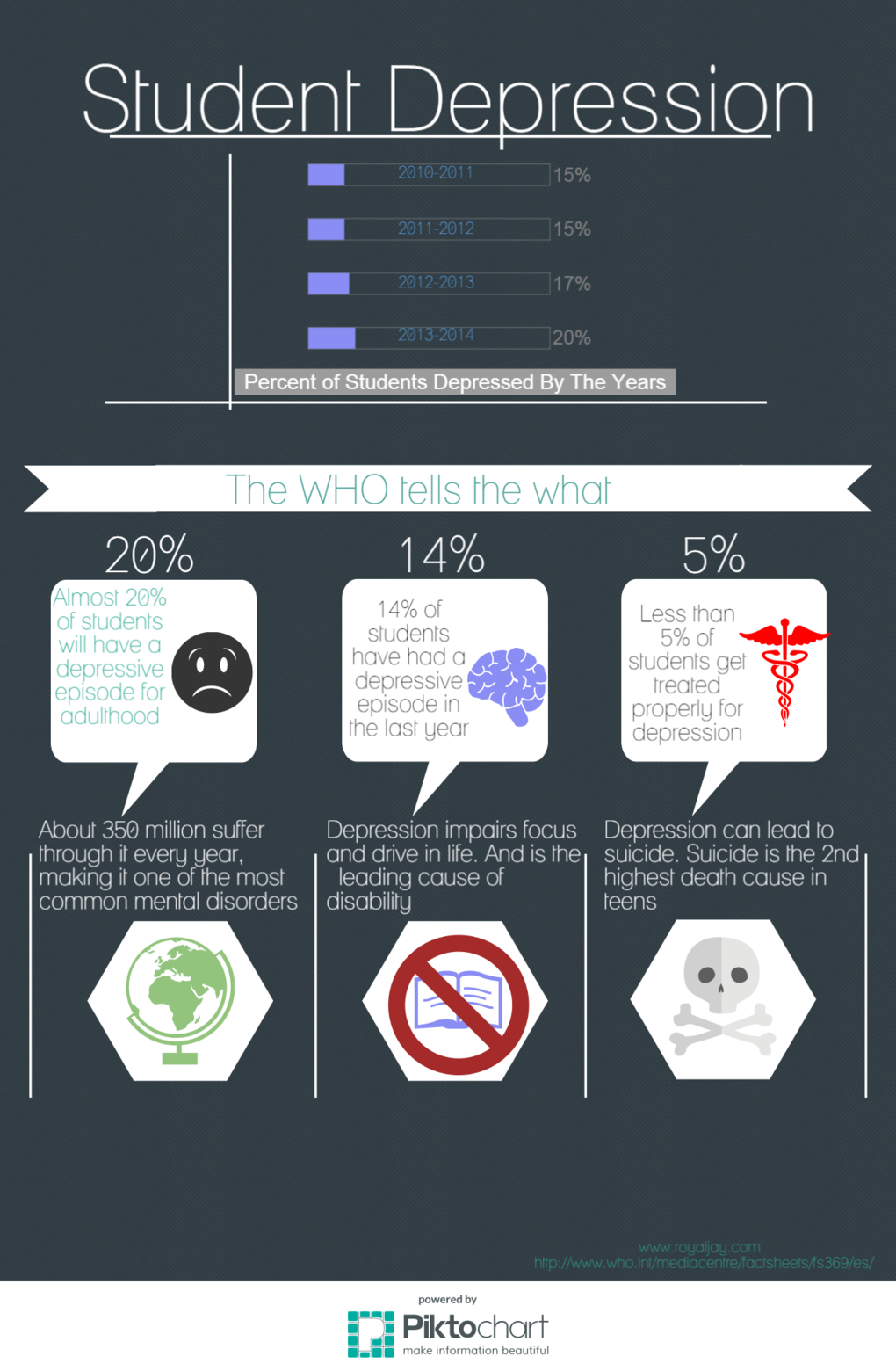
by Jordan Hanlon
Many stereotypes have been associated with teenage depression, including that depression isn’t even a real illness.
Depression is a serious and prevalent problem. According to Suicide Awareness Voices of Education, seven in 100,000 teenagers ages 15 to 19 commit suicide each year and the number is rising. This could be at least partially attributed to the reality that some people believe that depression is an indication of a poor mindset instead of a health problem.
“I am really tired of hearing some people refer to depression as a disease. It is not a disease, but more chemical and emotional imbalance of the brain, normally affected by long-term stress, deep trauma or grief, for some it is difficult to diagnose the root cause.” said ecologist Carolyn Shaw.
There are multiple causes for adolescent depression. In teenagers, depression is often caused by worry and stress about their grades at school or their undecided future.
“School usually makes me really stressed out. The pressure that came with school responsibilities definitely made my depression worse at the time,” said sophomore Sarah Greenbaum.
Other causes of depression can come from somewhere closer, like a student’s home situation or their family’s income. A teenager’s sexual orientation or drug use can also cause depression because of the way they are treated or looked upon by society. However, depression can develop from real physical and mental disorders like dysthymia, which causes moody or clinical depression, but has much longer lasting symptoms and is considered a disease.
“Symptoms are seen as manifestations of pathological physiological processes (disease) which are diagnosed and then treated with whatever methods available. The purpose of medical treatment is to eliminate, suppress or control the symptoms of the disease,” said clinical and forensic psychologist Stephen A. Diamond.
Another common stereotype often associated with depression is that talking about depression can cause others to develop depression.
According to Jeanne Segal, Ph.D., depression causes serious mood swings, feelings of sadness, anger, worthlessness, and hopelessness. Depression differs on a case-by-base basis, which can lead to personal problems and effects within an individual case. Other effects of depression include low self-esteem, headaches, and trouble sleeping.
Depression is also a leading factor in cases of anorexia, bulimia, social anxiety, and suicide. It can cause those affected to have trouble paying attention and enjoying everyday activities that were previously positive experiences. If depression goes untreated, it can lead to other physiological and physical problems.
“If someone you love is depressed, you may be experiencing any number of difficult emotions, including helplessness, frustration, anger, fear, guilt, and sadness. These unusual feelings of discontentment are all normal. It’s not easy dealing with a friend or family member’s depression. And if you don’t take care of yourself, it can become overwhelming,” said Segal.
According to the Mayo Clinic staff, many people feel ashamed about their depression and keep it to themselves. However, with the right treatment approach, one who is depressed can get better. Talking about depression in personal matters can help a depressed person by making them feel less alone.
There are many different therapies a patient could undergo if depressed. One popular type of therapy is psychotherapy, which encourages one who is depressed to talk about their feelings and learn to cope with their emotions.
“Depression is something that should not be overlooked. From a personal perspective, if you’re suffering from depression, you should reach out to others around you and get help,” said Greenbaum.
According to the National Health Institute of Mental Health, adolescents with depression have quickest and best recovery while on antidepressant medication, while also undergoing therapy.
“Someone who suffers from depression should under go multiple types of therapy for depression to see which one works best for your situation,” said Dr. Freda Lewis-Hall, Chief Medical Officer of Pfizer.
Depression is often misunderstood by those who have not experienced it personally. Many feel that teenagers and adults should be educated on the topic of teenage depression in order for stereotypes to be destroyed.
“Life isn’t easy with depression, but for me it was even worse as a teenager. We definitely need to be teaching schoolchildren about mental illness so that more young people do not experience the anxiety and stigma that I did,” said mental health blog Time to Change.
by Jackson Monge
“I just felt worthless.”
This is one of the many voices of depression that go unnoticed in school. Schools place a lot of emphasis on being physically healthy while some students need help when suffering from psychological issues.
Mental health has a strong correlation to physical health, as weak mental health can lead a person to do very little exercise and to indulge into unhealthier foods in large quantities. This ignorance of such an important factor in student health can rip apart a student’s confidence and effort.
Depression is a common mental affliction that causes moderate to severe sadness in people. According to the World Health Organization (WHO), it can cause large amounts of emotional pain to its victims, and may lead to problems completing tasks. Many who experience depression exhibit low self-esteem, difficulty concentrating, odd drops or increases in sleep and appetite, and irritable mood. The WHO also states that suicide brought on by depression leads to an estimated 1 million deaths every year.
“I just never wanted to leave my bed and I never told anyone. I never wanted to deal with the hassle of people knowing,” said sophomore Jet Penne. “My friends were all in the dark, and I felt it was just easier that way. I worked a little harder than normal so my grades would stay intact, and I put a mask on in front of my friends.”
His story parallels many others: hiding his real feelings due to feeling that no one would understand him. Another common parallel is that school demands even more effort from those who are depressed because of how hard it is to work on something when it’s difficult to even get out of bed.
Many students who suffer through depression lose purpose in school and cannot apply themselves. They begin to push friends and family away. The truth is that only people who have felt what they went through can really understand them.
The National Institute of Mental Health stated that depression affects a person in how they act socially. Their new social persona can cause some tensions in friendships. Many people are familiar with friends becoming distant or just wanting to be alone. That is typical of a person who has depression.

Depression is a real, treatable brain illness or health problem, often caused by large transitions in life and problems or stress at school, especially within teenagers.
Sophomore Alyssa Fong shared her experience about a friend who had depression. “My friend just became distant, and would occasionally get worked up on stuff that never bothered him before. It was an entire personality shift,” said Fong. “He never wanted it to be brought up, and the thought of being judged on it hurt him personally. It hurts watching someone you know suffering, and not being able to help them out.”
Many students don’t get the help they need. In fact, according to the WHO, fewer than 6 percent of students get treated for their depression.

Carlmont crisis counselor Shelley Bustamante described what many students who come to her go through. “There is always this direct impact with how they feel and how they act. I almost always hear about their grades dropping, and how they slowly detach themselves from their friends. Their change in sleeping and eating habits change their energy level for the worse, and they become more and more quiet ultimately losing a lot of their friends. It just flat out drains them, and I can see how hard it is for them to function.”
Many students don’t come forward and get the help they need for their depression, whether it be due to their own feelings caused by the illness or the social stigma surrounding the issue.



